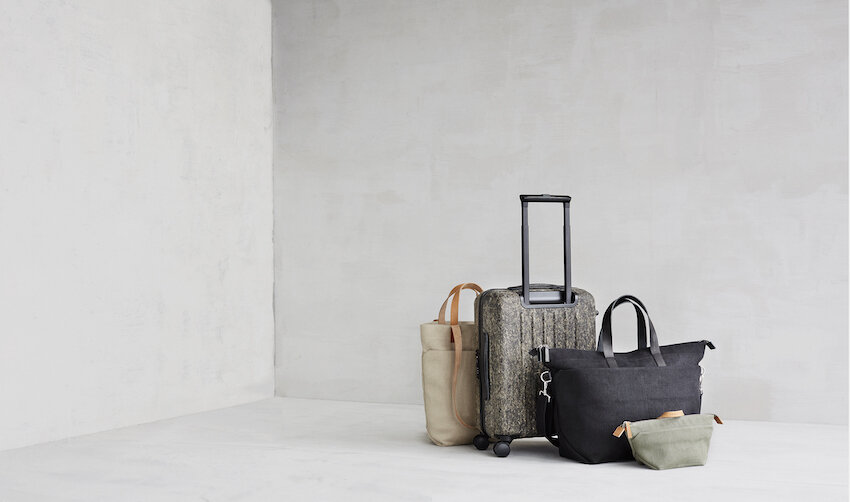PROJECTKIN
Website:
Instagram:
www.instagram.com/projectkintravel
About PROJECTKIN
Founded with the objective of rethinking product standards and a shift away from unnecessary consumption, PROJECTKIN create travel products of Nordic design. Sustainability is at the heart of their brand, with a focus on natural and long-lasting materials. Their product line is contemporary, design-led and built to last.
Fair Pay and Good Working Conditions
PROJECTKIN is committed to avoiding and addressing adverse impacts on the basic principles for social, environmental and economic development that they cause, contribute, or are linked to via their business relationships. They have implemented a Code of Conduct (CoC) with their suppliers to ensure that they demonstrate responsible business conduct. The scope of minimum requirements is based on the 10 general principles of the UN Global Compact and the CoC is also aligned with the UN Guiding Principles on Business and Human Rights (the UNGP’s). Their CoC has been developed by Dansk Mode & Textile and is as such an industrial standard CoC widely used by Scandinavian companies around the world.
Sustainable / Organic Materials
In their KIN Luggage products, the shell is made from an innovative, environmentally friendly bioplastic and flax material. This is a unique combination, not used in suitcase design before, and it saves approx. 2 kg of plastic per suitcase. To make the product last, they use the highest quality components they can find – in some cases these materials are not yet fully biodegradeable such as the Hinomoto wheels made of PET, zippers made from metal alloys and trolley handles made from recycled aluminum and plastic. They are committed to striving to find suitable, more sustainable materials, but are proud to be a much more sustainable alternative to many of the luggage options on the market today.
For their KIN Bags, they use hemp because for its natural and long-lasting characteristics. To ensure the bags withstand wear and tear and are long lasting, they use leather on straps and handles. Their leather is full grain vegetable tanned leather. In addition, to complement their luggage and bags, PROJECTKIN designed a line of KIN Accessories made with linen from flax fibres.
Sustainable Practices
PROJECTKIN is committed to operating its business in an environmentally safe and sustainable manner to protect the consumer, worker, environment, and the brand. They have developed their RESTRICTED SUBSTANCES LIST (RSL) as an integral part of this commitment. The compliance guidelines are intended to help users understand and comply with the RSL requirements. The RSL is shared with all suppliers – both factories producing finished products and suppliers of raw materials and components used to produce PROJECTKIN’s products.
The requirements in their RSL are in accordance with current national legislation and EU legislation, which includes the REACH legislation and voluntary eco-labelling schemes. The requirements reflect an awareness of how chemicals affect human health, the environment and the constantly increasing quality demands of consumers. PROJECTKIN require that their suppliers and partners study this document carefully and implement processes in their supply chain to comply with these requirements. Their RSL is shared with all upstream users in the supply chain, both factories producing finished products and suppliers of raw materials, components and chemicals.
PROJECTKIN requires that all suppliers comply with REACH and continuously follow the updates on the website of the European Chemical Agency (ECHA). Due to national legislations in some countries where they are selling their products, the limits in PROJECTKIN’s RSL are, in some cases stricter than in REACH.
Animal Welfare
PROJECTKIN use full-grain vegetable-tanned cow leather for their straps and handles, to ensure durability. While their products are mainly made with plant materials such as hemp, flax and cornstarch bioplastic, they chose to use leather for the details, like straps and handles, to ensure they create quality products that are sustainable through their longevity. When a true substitute that provides the same strength and durability as real leather emerges; they will start using it. All the hides that go into their leather are by-products of the food industry. Their leather supplier is furthermore part of the Leather Working Group.
Sustainable Packaging
Their packaging philosophy is “less is more”. When developing their products, they seek to pack with no plastics involved, and as little wrapping paper and carton as possible. Their shipping cartons are all genuine FSC certified and either recycled or mixed cardboard from responsible sources. Their wrapping paper and hangtags are made of a blend of hemp and recycled wooden paper, and they only use soy ink for printing.
Charity / Community Contributions
As a travel goods brand launched amidst the Covid-19 pandemic, they shifted their communication and adapted their mantra, Travel Mindfully, to inspire their community to stay home and to be mindful even of the shortest trips to the grocery store or short walks.
On the 20th of March they started their initiative to donate 50% of all profits to the COVID-19 Solidarity Response Fund for WHO. They chose this cause because it was a secure way for individuals, philanthropies and businesses to contribute to the WHO-led effort to respond to the pandemic. You can read more about the initiative at https://projectkintravel.com/covid-19



